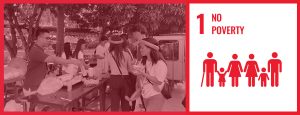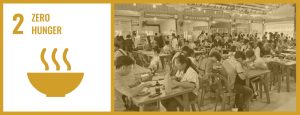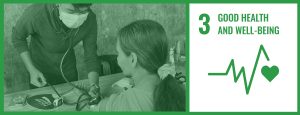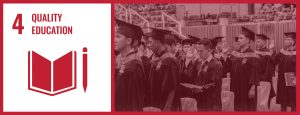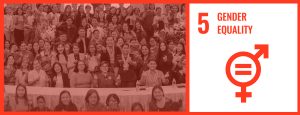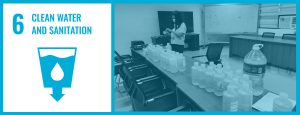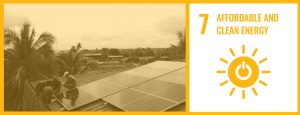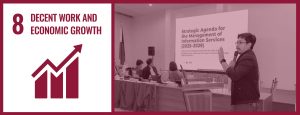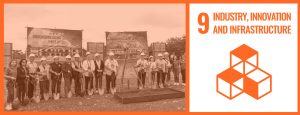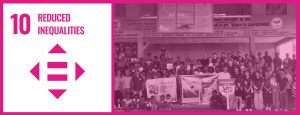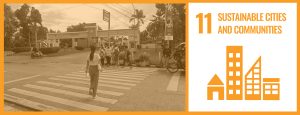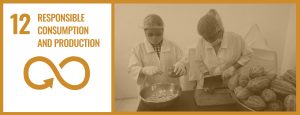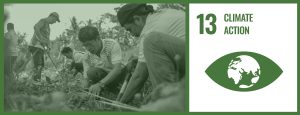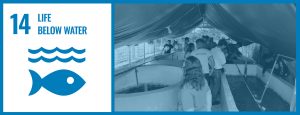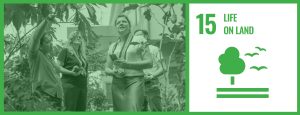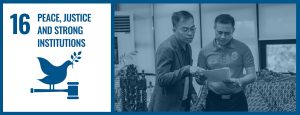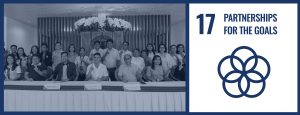2024 Reports | SDG 17 – Partnerships for the Goals

RELATIONSHIPS TO SUPPORT THE GOALS
Isabela State University (ISU) proactively nurtures relationships with national and regional government agencies, non-government organizations, and international partners to advance the SDGs. The University’s collaborations go beyond academic engagement, extending to policy development, governance dialogues, and the co-creation of sustainable interventions addressing real-world challenges.
Through conferences, consultative meetings, and multi-sector initiatives, ISU contributes to identifying societal problems, shaping responsive policies, and promoting adaptive management strategies aligned with sustainable development. These initiatives demonstrate ISU’s institutional commitment to SDG 17—serving as a convenor, policy contributor, and knowledge hub for sustainable partnerships.
Relationships with Regional NGOs and Government for SDG Policy
ISU consistently engages in policy formulation and collaborative governance that reinforce sustainability and innovation. Through active participation in national and regional discussions, the University provides platforms for integrating science, policy, and community needs—helping shape development priorities aligned with the SDGs.
Two major initiatives exemplify this commitment: (1) ISU’s leadership in facilitating the iSCENE 2024 special sessions on smart and sustainable cities, and (2) its consultative collaboration with the Department of Health (DOH) and the Provincial Government of Isabela for the establishment of the Southern Isabela Medical Center (SIMC) Cancer and BUCAS Centers. These partnerships demonstrate ISU’s role in identifying challenges, designing solutions, and supporting policy implementation that advances both local and national sustainability agendas.
Related Links:
(1) iSCENE 2024 Opens, ISU to Facilitate Special Sessions
(2) ISU Welcomes DOH Usec Vergeire for Consultative Meeting
Cross-Sectoral Dialogue about the SDGs
Anchored on its Quality Policy, Isabela State University affirms its institutional commitment “to engage in sectoral policies for community development”—a principle that aligns squarely with SDG 17’s call for partnerships and multi-stakeholder collaboration. This policy guides ISU’s mission to serve as a bridge between academia, government, industry, and civil society in advancing sustainability and inclusive growth. The University’s cross-sectoral dialogues encompass science and technology, gender mainstreaming, futures thinking, and sustainable city development—each reinforcing ISU’s role as a convenor and knowledge partner in policy and innovation for the SDGs.
Related Links:
(1) Quality Policy
(2) ISU hosts DOST goat embryo transfer tech presscon
(3) RDC2 RGADC conducts 4-day summit, 8 completes RPGRP program
(4) Envisioning a future-oriented Isabela State University: Top execs join futures and foresight capacity development
International Collaboration on Data Gathering for the SDGs
Isabela State University demonstrates a strong institutional commitment to international collaboration in research and data generation that directly supports the monitoring and achievement of the Sustainable Development Goals. Guided by its mandate as a regional research hub, ISU Research actively engages in multi-country and interdisciplinary partnerships that advance innovation, sustainability, and evidence-based policymaking. Through its wide research network and international linkages, ISU contributes to the collection, validation, and sharing of reliable data that inform national and global development indicators.
Research Agenda
The University Research Agenda serves as the strategic blueprint of ISU Research, setting the direction for data-driven and SDG-oriented initiatives. Developed with full consideration of the University’s internal strengths and external opportunities, the agenda defines ISU’s research priorities through two lenses: commodity-based thrusts that build on the University’s disciplinary expertise, and thematic research areas that align with global sustainability goals.
Commodity-based research thrusts focus on:
- Precision and Smart Agriculture: Rice and corn production, industrial crops such as rubber, sugarcane, and cacao, and tropical fruits;
- Organic Agriculture: Root crops, legumes, indigenous vegetables, native animals, and indigenous plants for health and wellness;
- Fisheries and Aquaculture: Tilapia, hito, and ulang production;
- Farm Machineries, Metal Craft, and Electronics: Enhancing agricultural productivity through innovation and mechanization;
- Watershed and Biodiversity: Ecosystem management and conservation;
- Higher Education and Social Science Research: Studies that inform educational reform and social transformation;
- Disaster Risk Reduction and Management: Research on hydrometeorological hazards in the Cagayan River Basin and island communities; and
- Renewable Energy: Exploration of micro-hydro, solar, biomass, and biofuel technologies for sustainable energy.
These priorities are complemented by seven thematic research thrusts: Smart and Precision Agriculture, Organic Agriculture, Renewable Energy and Biofuels, Climate Change and Disaster Science, Biodiversity and Environment, Farm Mechanization, and Socio-Economics and Higher Education.
The Research Agenda, regularly reviewed and updated, serves as the foundation for proposal development, funding allocation, and evaluation. It ensures that ISU’s research outputs not only respond to regional challenges but also generate measurable data that contribute to global sustainability metrics.
Research Excellence
ISU’s strong research culture has positioned it at the forefront of academic and applied research in the Cagayan Valley Region. Its innovations have influenced community-based development, local industry competitiveness, and evidence-based governance.
ISU currently maintains 31 active R&D Centers, the highest number in Northeastern Philippines, functioning as the backbone of its research ecosystem. Among these are two DOST–NICER classified centers that serve as major contributors to international data collection and sustainability monitoring:
- The Smart Water Infrastructure and Management (SWIM) R&D Center, which pioneers smart systems for water monitoring, hazard prediction, and governance reform to address water productivity and resource fragmentation; and
- The Cagayan Valley Freshwater Fisheries Center, a world-class facility for interdisciplinary aquaculture research and data generation supporting sustainable fisheries and food security.
These centers, together with ISU’s broader R&D network, produce data that support global reporting on agriculture, water management, biodiversity, and climate resilience. The University’s ongoing collaboration with international experts and consortia ensures that its research adheres to global scientific standards and contributes to the worldwide SDG database.
Research Centers
ISU’s R&D Centers serve as specialized hubs for interdisciplinary research, data generation, and policy development. They operate within national and international partnerships that foster the exchange of datasets, methodologies, and best practices.
Key centers include:
Smart Water Infrastructure and Management R&D Center
The Smart Water Infrastructure and Management R&D Center advance water management systems through new innovative approaches and smart techniques to address low water productivity, recurring water hazards due to extreme climate events, fragmented approach in water management, inefficient and ineffective delivery of water services as well as insufficient water monitoring and planning.
Cagayan Valley Freshwater Fisheries Center
A world class center of excellence on freshwater aquaculture for research, development and demonstration by spanning Interdisciplinary Research Programmes (IRP’s) in Aquaculture.
Cagayan Valley Small Ruminants Research Center
Research Center that aims to transform small ruminant production from a subsistence type of farm activity into a viable livestock-based enterprise.
Cagayan Valley Cacao Development Center
The Cagayan Valley Cacao Development Center (CVCDC) acts in synergy with the other government organizations, non-government and private organizations to promote industry that is commercially viable, socially and culturally acceptable and environment-friendly for local, regional and international markets, contributing to a sustained economic development of Region 02.
Water Research and Development Center
A world class center providing S & T solutions through research, extension, laboratory services and capacity building in the water sector.
Equipment Manufacturing Center (EMC)
A world-class manufacturer and supplier of Agro-Industrial Machineries, equipment-parts and components.
Cagayan Valley Program on Environment and Development (CVPED)
CVPED acts as a proactive link to scientific knowledge and information for policy decisions responsive towards sustainable development of natural resources in the region.
Food Innovation Center
The Food Innovation Center (FIC) in ISU Cauayan Campus, is a food processing center with common service facilities for product development and packaging. It will serve as a one-stop-shop for food research and development and technology transfer for would be adopters and beneficiaries.
Philippine Research and Development Center for Mungbean
The Philippine Research and Development Center for Mungbean contributes to and assists farmers, scientists, and any other interested or associated disciplines in the enhancement and expansion of the mungbean crop and its products and byproducts.
Upland Development Center
The URDC envisions to be the leading institution in upland and rural development in Asia with special focus on: Upland Technology Transfer, Buffer Zone Management, and Landscape Ecology and Rehabilitation.
Regional Center for Innovation and Teaching Excellence (ReCITE)
The Regional Center for Innovation and Teaching Excellence (ReCITE) is envisioned to serve as a regional innovation center for teaching excellence.
Business Intelligence and Research and Development Center (BIRD-C)
The center analyzes data and develops apps to help LGUs make confident and appropriate responses in a crisis, in order to become more proactive. It is hoped that through the BIRD-C, our LGUs will become more active in finding solutions and innovations to further improve the lives of the people through the data they analyze.
Climate Change Center
The Center’s vision is a Center of Excellence in climate change adaptation, mitigation and climate- risk resiliency in Cagayan Valley, the country, and the ASEAN region. It is committed to exist as a self-sustaining holistic functional service and capacity-building facility on climate change R&D providing climate change adaptation, mitigation and disaster risk reduction education and expert services to various clients and utilizing science-based information/technology in addressing climate change all geared towards climate-risk resiliency.
Cagayan Valley Cattle Artificial Insemination Research and Training Center
The University continues to pursue knowledge-based and product development as a result of research and breakthroughs in science and technology, engineering, agriculture, ecology, culture, and the arts for environmental protection, progressive industry, human development, and sustainable living.
Through these centers, ISU contributes to the global body of scientific knowledge and provides datasets that guide sustainable development planning, not only in the Philippines but also in international research networks.
Research for Development
The Research for Development (R4D) framework of ISU bridges the gap between knowledge generation and community application. Through partnerships with the Department of Science and Technology (DOST), the National Irrigation Administration (NIA), and various local government units, ISU transforms research findings into data-supported interventions that address pressing regional issues.
These collaborations generate measurable data on technology adoption, agricultural productivity, climate resilience, and socio-economic outcomes. The University’s Technology Business Incubation (TBI) initiatives help translate scientific findings into commercial and social innovations, fostering a feedback loop that informs both policy and future research design.
ISU’s sustained engagement with industry partners ensures that its datasets remain practical, policy-relevant, and anchored on the real needs of communities.
Knowledge and Technology Generation and Management
As a higher education institution, ISU serves as a generator, validator, and disseminator of knowledge and technology. Its R&D thrusts span the full research continuum—from basic and strategic research to applied and technological integration.
ISU’s Knowledge and Technology Management (KTM) system ensures that research outputs undergo a rigorous peer-review and validation process before being adapted for real-world use. Verified knowledge progresses through stages of technology adaptation, verification, piloting, packaging, and commercialization, with clear criteria for technical feasibility and economic viability.
This process guarantees that only validated and high-quality data enter the policy or production cycle, ensuring the credibility of ISU’s contributions to local and international SDG data systems. The KTM approach also emphasizes intellectual property rights, technology transfer policies, and resource sharing mechanisms that enable broader collaboration across research institutions and industries.
Policy Research and Advocacy
ISU recognizes that policy research is a cornerstone of sustainable development. Its research advocacy agenda focuses on creating an enabling environment for science and technology management, promoting environmental protection, addressing climate change, and enhancing the well-being of its faculty, staff, and students.
ISU’s policy research thrusts include formulating and advocating for policies that improve research operations, conducting impact assessments, and supporting renewable energy, conservation, and circular economy initiatives. By translating data and research findings into policy recommendations, ISU strengthens its role as a thought leader in evidence-based governance and sustainable development.
Capability Building and International Cooperation
ISU continues to cultivate a strong R&D workforce capable of contributing to international collaborations and global research exchanges. Through training, academic partnerships, and participation in international conferences, ISU develops a multidisciplinary pool of experts and scholars.
The University promotes bilateral and multilateral cooperation with global research centers and universities to encourage data-sharing, co-publication, and scholarship exchange. Faculty and research staff participate in foreign research projects and post-doctoral programs, ensuring that ISU’s methodologies and datasets remain comparable with international standards.
By aligning capacity development with industrial and policy needs, ISU sustains a research environment that is globally connected and locally responsive.
Through its robust research agenda, network of 31 specialized R&D centers, and comprehensive systems for knowledge generation and technology management, Isabela State University actively participates in international collaboration on SDG-related data collection, analysis, and dissemination. Its institutional framework—from precision agriculture to climate resilience and policy research—ensures that the University’s outputs contribute to the global pool of reliable and comparable sustainability data.
By linking its regional research strengths with international collaborations, ISU fulfills its vision of becoming a premier research university in the Asia-Pacific, championing science-based innovation, data-driven governance, and knowledge partnerships for sustainable development.
Collaboration for SDG Best Practice
Isabela State University (ISU) demonstrates its commitment to the Sustainable Development Goals (SDGs) by engaging in international collaborations and research partnerships that promote the exchange of knowledge, comparative policy studies, and the co-creation of global best practices. These collaborations allow the University to benchmark its initiatives against international standards, learn from diverse models of sustainable development, and share its own innovations with partner institutions abroad.
Through research linkages, joint programs, and international benchmarking visits, ISU contributes to the global discourse on sustainable governance, education, technology, and community development. The University’s partnerships serve as platforms for developing evidence-based, cross-cultural approaches to SDG implementation, enabling continuous improvement of institutional practices and fostering mutual learning with global peers.
These international engagements exemplify ISU’s role in developing and sharing best practices for sustainability through research, innovation, and academic exchange. Each collaboration demonstrates how the University transforms partnerships into opportunities for comparative learning and the advancement of international SDG-aligned models.
Related Links:
(1) ISU spearheads kickoff meeting on Sediment Evaluation and Development Intervention Project with DOST, BulSU, and NIA
(2) ISU and Howest University of Applied Sciences (Belgium) formalize partnership through MOA signing
(3) ISU signs business deal with DOST and Korean Innopolis Institute Enterprise Association (IIEA)
(4) RAISE-CV conducts regional technology and product exhibit at ISU’s 46th Founding Anniversary
(5) ISU forges two international collaborations after cross-border ventures in Vietnam
Collaboration with NGOs for the SDGs
Goals (SDGs) requires strong partnerships that extend beyond the government and academic sectors. In pursuit of inclusive and sustainable progress, the University actively collaborates with non-government organizations (NGOs), civil society groups, and local communities in implementing programs, projects, and research initiatives aligned with the SDGs.
These collaborations enable ISU to bridge academic expertise with on-the-ground experience, creating synergy between scientific knowledge, social innovation, and community participation. By partnering with NGOs, ISU strengthens the implementation of programs that promote environmental conservation, public health, gender equality, education, and livelihood development—ensuring that its research and extension efforts contribute meaningfully to sustainable and equitable growth.
Through these multi-sector engagements, the University supports evidence-based community interventions, promotes participatory governance, and advances social inclusion. The following initiatives illustrate how ISU’s partnerships with NGOs translate into tangible contributions to the SDGs, combining institutional capacity with grassroots action to address both local and regional development challenges.
Related Links:
(1) ISU, SWIM turn over Comprehensive Water Resources Management Plan to Batanes province
(2) ISU celebrates SWIM building inauguration, KIST park groundbreaking
(3) RAISE-CV conducts Regional Technology and Product Exhibit at ISU 46th Founding Anniversary
(4) UUM, MRSP conduct lecture at ISU on mainstreaming gender in mechatronics, robotics, IoT technologies
(5) ISU, PNU-NL partners for HERAI use, transfer
(6) ISU, LGU Echague sign MOA for utilization of disaster monitoring app
(7) ISU, PNVSCA inks MOU to mainstream volunteerism
(8) ISU forges partnership with Tanggol Kalikasan Inc. to establish Institute of Environmental Governance
(9) ISU launches cross-visit to Universitas Brawijaya
(10) Taiwan Ambassador Chow visits ISU, CVCDC
(11) Brock University visits ISU, signs MOU for co-operation
(12) ISU, LGU Echague partners for Center for Yogad Studies
PUBLICATION OF SDG REPORTS
In line with its commitment to transparency, accountability, and sustainable development, Isabela State University (ISU) regularly documents and disseminates its contributions to the Sustainable Development Goals (SDGs) through institutional reports. These publications highlight ISU’s programs, policies, research, and partnerships that advance the 17 SDGs and reflect the University’s integrated approach to education, innovation, and community development.
Anchored on its vision as a globally recognized research university for people and nature, ISU ensures that its sustainability efforts are data-driven, evidence-based, and publicly accessible. The publication of SDG reports demonstrates the University’s culture of openness and continuous improvement, enabling comparative learning, multi-sector collaboration, and benchmarking with global best practices.
The SDG report (SDGs 1–17) presents ISU’s contributions to each goal, showcasing measurable outcomes and best practices that align higher education with the global pursuit of a more inclusive, resilient, and sustainable future.
EDUCATION FOR THE SDGS
Education for SDGs: Commitment to Meaningful Education
Isabela State University (ISU) upholds a strong commitment to meaningful, inclusive, and transformative education that integrates the principles of the Sustainable Development Goals (SDGs) across all academic programs and learning environments. Guided by its mission to “develop globally competent human resources through quality instruction, research, extension, and resource generation,” the University ensures that sustainability is not treated as a peripheral theme but as a core educational value embedded in its curricula, pedagogy, and institutional culture.
This commitment is evident in ISU’s alignment of its instructional frameworks and course offerings with global and national development priorities, particularly those centered on sustainability, innovation, and social responsibility. Through SDG-oriented institutional subjects, faculty training, research-based instruction, and community immersion activities, ISU provides students with the knowledge, values, and skills necessary to address complex societal challenges. By integrating sustainability literacy across disciplines, ISU empowers learners to become agents of change—capable of translating classroom learning into solutions that advance environmental stewardship, social equity, and economic resilience. The following evidence illustrates how ISU operationalizes its commitment to meaningful education for the SDGs across the University.
Related Links:
(1) Best Practice | Sustainability Literacy of ISU Students through SDG-Oriented Institutional Subjects
(2) 30 ISU students participate in Learning Express Program
(3) ISU, Accenture engages in meeting-orientation on ATA
(4) Global Cacao: ISU opens doors for international intern from Vives University
(5) To the Philippines and beyond: ISU sends students to the Intensive Programme Belgium 2024
(6) Isabela State University – Cagayan Valley Small Ruminants Research Center’s Post
Education for the SDGs: Specific Courses on Sustainability
Isabela State University (ISU) ensures that its commitment to sustainability extends beyond advocacy—embedding it directly into its academic offerings through dedicated degree programs and electives that address the principles and goals of sustainable development. These programs are designed to equip learners with both the scientific and socio-political understanding necessary to respond to the world’s pressing environmental and developmental challenges.
By integrating sustainability into its curricula, ISU advances education that is practical, evidence-based, and globally relevant, fostering professionals who can contribute to climate resilience, environmental management, and sustainable community development. These programs also serve as platforms for research, innovation, and policy dialogue—bridging theory and practice in support of national and international sustainability frameworks.
Among ISU’s academic programs that exemplify this commitment are the Bachelor of Science in Forestry and the Master of Science in Disaster Risk Management – Climate Change Adaptation (DRRM–CCA) offered at ISU Cabagan Campus. Both programs embody the University’s vision of higher education as a catalyst for climate action and sustainable development, preparing students to lead in environmental governance, resilience planning, and sustainability advocacy.
Education for the SDGs in the Wider Community
Isabela State University (ISU) extends its commitment to the Sustainable Development Goals (SDGs) beyond the classroom by bringing sustainability education directly to communities. Through its extension programs, capacity-building initiatives, and lifelong learning activities, ISU ensures that education for sustainable development reaches not only students but also alumni, local residents, marginalized groups, and other community stakeholders.
Anchored on the University’s Extension and Community Development Agenda, these initiatives promote inclusive growth, environmental stewardship, and social empowerment through knowledge transfer and participatory learning. ISU’s community education programs are strategically aligned with national and local development priorities, addressing areas such as sustainable agriculture, environmental management, public health, gender equality, livelihood training, and disaster preparedness.
By transforming academic knowledge into practical applications for the wider public, ISU serves as a catalyst for community-driven change—empowering individuals and local institutions to take collective action toward the SDGs. The following evidence illustrates how ISU operationalizes its role as an educator for sustainability at the grassroots level, ensuring that the benefits of education extend to every sector of society.
Related Link:
(1) ISU, FDA sign MOU for MSMEs capacity-building, support
UNIVERSITY EXTENSION THRUST, DIRECTION AND AGENDA
Extension programs articulate the social relevance and conscience of the Isabela State University as a facilitator of countryside development. The extension team thereby anchors its effort on the communities to uplift their living conditions through the realization of the full potential of every person it works with and in harnessing rural folks capabilities in effectively and efficiently utilizing the gamut of community resources. To be more functional and more relevant, extension services primarily aimed at reaching out to the poorest local government units and rural communities and help them build up their capabilities to become self-reliant and empowered. Moreover, the University is envisioned to develop effective extension modalities and strategies with great focus on social mobilization and development of viable S & T and rural-based enterprises.
More information can be accessed here: https://isu.edu.ph/extension-agenda/
Related Links:
(1) Isabela State University Launches Herbal Health Initiative for Community Empowerment
(2) Isabela State University and Local Health Partners Launch Community Health Initiative
(3) Cauayan Campus Extension and Training Services
(4) Acts of Kindness for Typhoon victims
(5) Isabela State University – Cagayan Valley Small Ruminants Research Center’s Post
(6) Training Workshop and Installation Groundwater Monitoring Sensors at Echague, Isabela


